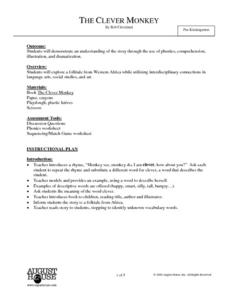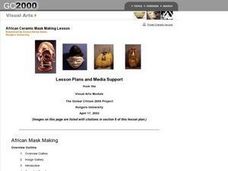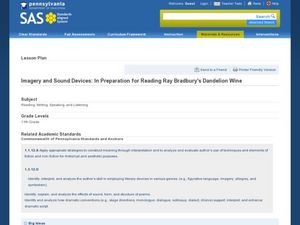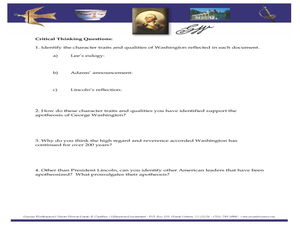Curated OER
Literary Analysis - Young Goodman Brown
Why is literary analysis so important? Readers explore writing a literary analysis by reviewing literary elements such as character, metaphor, plot, setting, simile, personification, and style. They read "Young Goodman Brown" by...
Curated OER
Review of Literary Devices
Sixth graders review literary devices. They use both fiction and nonfiction texts to review metaphor, simile, alliteration, imagery, symbolism and personification. This lesson has a scripted guide for the teacher to follow.
Curated OER
The Use of Language in "I Know Why the Caged Bird Sings"
Readers of I Know Why the Caged Bird Sings are asked to craft an essay in which they compare how Maya Angelou uses figurative language to depict herself and Mrs. Flowers.
August House
The Clever Monkey
Your clever kindergartners will enjoy a series of activities based on the West African folktale, The Clever Monkey, adapted by Rob Cleveland. They sequence the story with pictures, copy sentences, illustrate idioms about cats, and taste...
Curated OER
A Rose Is a Rose
Flowering learners explore the concept of figurative language as it relates to poems, songs, or creative written expression. In this creative writing lesson, they complete several phrases using similes, metaphors, and personifications. ...
Curated OER
Simile Stories
Fourth graders view song lyrics and identify similes in the song text. In this similes lesson, 4th graders define and identify similes on a worksheet. Students write their own similes using various adjectives.
Curated OER
History According to Shakespeare
Middle schoolers read Shakespeare's, Julius Caesar while identifying a number of literary elements including simile, metaphor, personification, and hyperbole. As a response activity, they simulate a mock trial, and finally, compare and...
Curated OER
African Ceramic Mask Making
Students investigate a variety of African mask types, design several masks, and create an example of an African ceramic mask in this 5th grade through High School Art lesson. The lesson can take anywhere from 6 lessons to 16 lessons.
Pennsylvania Department of Education
Exploring Key Ideas and Details in Fiction and Nonfiction
Third graders participate in activities to differentiate fiction from nonfiction. In this fiction lesson, 3rd graders describe the elements of a fiction story. Students compare and contrast fiction and non fiction elements. Students...
Curated OER
Language Arts, Music, Poetry: Blues Style
This lesson focuses on how the blues both operates as poetry and informs the poetry of many prominent African American poets. Students consider the poetic devices and recurring themes in blues lyrics and the significance of the poetry of...
Curated OER
Poetry of Abraham Lincoln
Fourth graders analyze Abraham Lincoln's poems "The Bear Hunt" and "My Childhood's Home" for word choice and deeper inquiry into the vocabulary he uses to convey emotion. They identify rhyming words and patterns in these poems. ...
Curated OER
Imagery and Sound Devices: In Preparation for Reading Ray Bradbury's Dandelion Wine
Twelfth graders analyze Ray Bradbury's use of techniques and elements of fiction as well as nonfiction in the novel Dandelion Wine. In this novel analysis lesson, 12th graders analyze the sensory techniques in Dandelion Wine. Students...
Curated OER
The Apotheosis ofGeorge Washington
Students examine the image of George Washington. In this Washington presidency lesson, students use the provided analysis handout to analyze the character of Washington conveyed in several pieces of art and speeches. Students share their...
Curated OER
Using Rock to Teach Literary Devices: Jimi Hendrix “The Wind Cries Mary”
Students explore literary elements through music. In this figurative language lesson, students examine imagery and personification in "The Wind Cries Mary" by Jimi Hendrix.
Curated OER
Pictures in Words: Poems of Tennyson and Noyes
Students analyze poems by Tennyson and Noyes. They identify examples of alliteration, onomatopoeia, personification, metaphor, and simile. Students create examples of alliteration, onomatopoeia, personification, metaphor, and simile.
Curated OER
Alliterations Allowed
Fourth graders recognize and create alliterative language in both literary and commercial use. In this language arts lesson, 4th graders analyze pieces of poetry and focus on the use of imagery, personification, and figures of speech.
Curated OER
Connecting Poetry with Philanthropy
Young scholars use their knowledge of philanthropy and poetic conventions to write original poetry about philanthropic giving. In this philanthropy lesson, students write poetry based on philanthropy using poetic conventions. Young...
Curated OER
Twelfth Night Act 2 Scene 1
Students perform a close reading analysis of Shakespeare's Twelfth Night Act 2, Scene 1. Students examine the characters of Sebastian and Antonio and discuss themes, particularly those of the potential for tragedy within a comedy and...
Curated OER
Crafting Poetry: A Sensory Journey
Tenth graders experiment with poetry devices to write poems. In this poetry lesson, 10th graders participate in learning stations. Students create a word pool and select a word from the list to create a line of poetry. Students complete...
Curated OER
Read Aloud Lesson Plan
Students listen as the novel "On My Honor" is read to them. They identify similes and the characters differences in the novel.
Curated OER
Searching for Images in Poetry
Young scholars are introduced to the concepts of similes, metaphors and personification. In groups or individually, they read different poems identifying the similes, metaphors and instances of personification in each. They record all...
Curated OER
Figurative Language in Poetry and Prose
Students examine the impact of sound devices in poetry. In this poetry lesson, students read the listed poems and identify uses of hyperbole, simile, metaphor, imagery, and personification. Students discuss how sound devices enhance poetry.
Curated OER
Ode to a Nightingale
Learners read poems about Tuberculosis by John Keats. Using the poems, they identify similies, metaphors, personification and imagery. In groups, they make connections about the author's outlook on life and how his disease impacted his...
Curated OER
Out of the Dust: Figurative Language
Students find examples of figurative language in "First Rain" in Out of the Dust. In this Out of the Dust lesson, students takes notes on various type of figurative language and identify examples of each type in the poem.

























